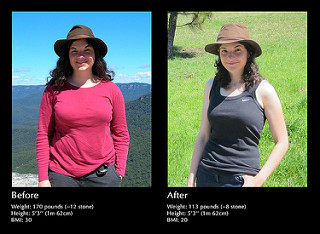The Relationship between Getting Enough Sleep and Weight Loss
Getting enough sleep is important in a weight loss program. When you do not sleep enough, hormonal changes take place in your body that lead to weight gain. The extra hours of awake time may lead to unnecessary eating. Additionally, the hours spent in sleeplessness are often hours you spend in sedentary activities such as watching TV, sitting at the computer or reading a book.
The Research
Researchers set out to explore why it is that Americans who are generally sleep deprived are also overweight. They found that being deprived of sleep leads to a lowering in the specific hormones that make you feel satiated. Also discovered was that sleep deprivation leads to an increase in hunger hormones. In essence, by not sleeping enough, you will feel more hungry more often and may overeat because you do not feel full.
The recommended amount of sleep for adults is eight hours. Estimates indicate that more than half of American adults sleep less than this amount. In reality, the average adults sleeps less than seven hours each night.
Twelve men of healthy weight participated in an experiment. Those who were deprived of sleep experienced the biggest changes in hormones. They felt the hungriest. In addition, they craved foods that are deemed less nutritious, such as pasta, sweets and bread. Participants experienced no serious hunger issues when they had longer nights of sleep.
Researchers have also found that sleeping two to four hours a night is linked with obesity. Those who fall into this group are 73% more likely to be obese than individuals who sleep between seven and nine hours each night.
Implications
Clearly, a correlation exists between sleeplessness and weight gain. If your goal is to lose weight, pay close attention to your sleep patterns. Are you sleeping enough hours? Are you dealing with interrupted sleep? Are there things that you can do to sleep through the night without disruptive light or noise?
In some life situations, sleeping enough is not possible because of a crying baby or other responsibilities. However, when possible, try to put healthy sleep patterns in place. Go to bed at the same time each night. Going to bed at various times confuses your body's clock. Keeping your bedtime consistent will have you automatically feeling sleepy at the same time each night and more apt to fall asleep.
Pay attention to reasons that you may be waking up in the middle of the night. If there are unavoidable noises, consider wearing ear plugs. If your room is not dark enough, get darker curtains or use an eye cover. If you wake up to go to the bathroom in the middle of the night, consider lowering your liquid intake as you near your bedtime.
Getting more sleep will balance your body's hormones and reduce urges to overeat. It will also give you less time to engage in activities that involve sitting and eating.
-
Losing Weight After 50 – Include Activities Into Your Program
Article three of my five article series on losing weig
-
Quick And Simple Steps To Lose Belly Fat And Proudly Flaunt A Six Pack Abs
Are you desperate to flaunt that stunning six pack abs but cannot due
-
What To Consider In Choosing The Right Weight Loss Techniques
With the advent of the internet, the deluge of information of weight
-
The Best Workout Music – Create a Workout Playlist from over 300 Songs!
Music is a great way to get the most out of exercising and also makes
-
How To Find a Good Liposuction Surgeon
When interviewing potential liposuction
-
The Secrets Behind Losing Weight Effectively And Safely
Fitness and nutrition go hand in hand. You cant go out and expect to w
- DON'T MISS
- Is Hypothyroidism Making You Gain Weight?
- Are You Ready For The New You?
- Atkins Diet Review The Truth About The Atkins Diet
- Why Hypnosis Works For Weight Loss
- The Spiritual Component Of Weight Loss
- Are You Addicted To Food And Eating?
- A Weekly Workout To Build Muscle That Gets Results
- Tips To Lose 20 Pounds
- Celebrating the Fourth of July, Eating Healthy, not Junk Food
- Belly Fat Loss Diet: 3 Interesting Tricks To Keep Your Diet On Track




